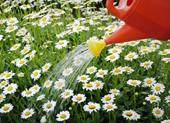
Water is a vital part of a successful garden; it’s needed to produce vegetables, fruits and to maintain garden beds and lawns.Without water very few plants would have the ability to bloom.
With imposed water restrictions in many areas, all is not lost for gardeners. In fact it’s actually helping educate people about watering sustainably. A little water every day is one of the worse things you can do for your plants.
Regular light watering encourages the roots to stay at the surface of the soil looking for water, which isn’t ideal, as these plants often become top heavy and can flop and fall over because they can’t anchor themselves deeply enough into the garden.
Moisture is lost through leaves, bark and roots in the soil. Wind is one of the most moisture sapping elements we have to deal with. Symptoms of inadequate plant watering are poor plant performance, plant death, visible water run-off without penetrating the soil, and dry spots along with increased levels of pest and disease.
The 2 golden rules about watering are:
- When and how to water
- Mulch.
When and how to water
Do the finger test – if your finger is dry when you pull it out of the soil, water the soil.
Signs to watch out for are wilting leaves and the soil simply feeling dry.
A garden is best watered in the morning or late afternoon.
Water the soil, not the plant. This goes for pots and containers too. The roots take up most of the water, the leaves use a little but nothing in comparison to the root system.
Water thoroughly and DEEPLY every few days, 2 to 3 times a week is all that is required. Deep watering encourages the plants roots to seek down for water, which firmly anchor the plants to the ground. It is also helpful to ensure your soil retains moisture by including wetting agents. Saturaid is a granular soil wetter that helps prevent soil drying out and can be used in garden beds as well as container plants.
Saturaid draws water down into the root zone where it is needed most, resulting in stronger and healthier plants.
With baskets and containers that dry out completely, the best way to rehydrate them is to place the whole container in a bucket or trough of water and let the water soak up through the soil and root zone. This may take hours, but your plants will love you for it.
Mulch
Mulch is a god send to the garden, it limits weeds, looks tidy, enables soil retain moisture and it keeps plant roots cooler. A cooler root zone is less stressful on plants, allowing them to get on with growing, rather than just surviving.
Numerous things can be used as mulch, manures, straw and compost. Garden centres have a huge range to choose from.
Pelletised Pea Straw is about the easiest one to use and apply. It creates a protective layer that conserves moisture and conditions soil. Each pellet swells four times in size once watered, to give complete mulch cover and great value for money.
Another popular organic option is Tui Mulch & Feed, this bark based mix is blended with pea straw, blood & bone and powdered sheep manure.
Post a comment
Water – the lifeline of a garden Comments
Be the first to write a comment